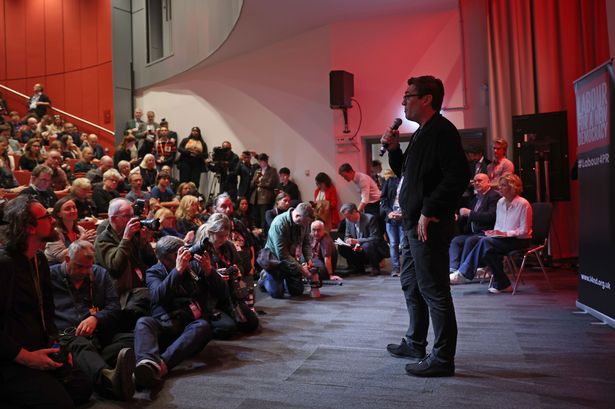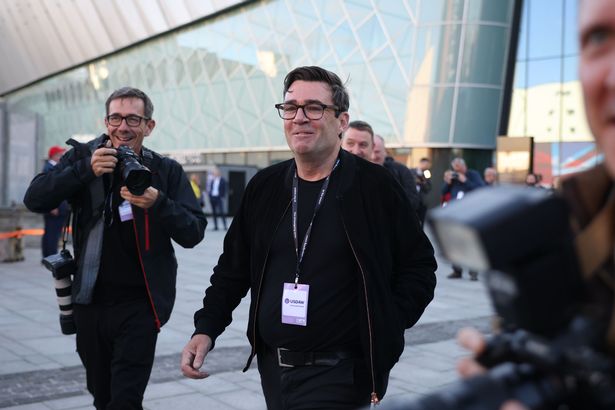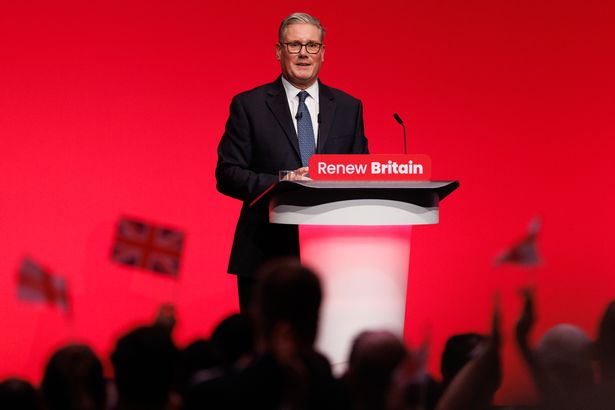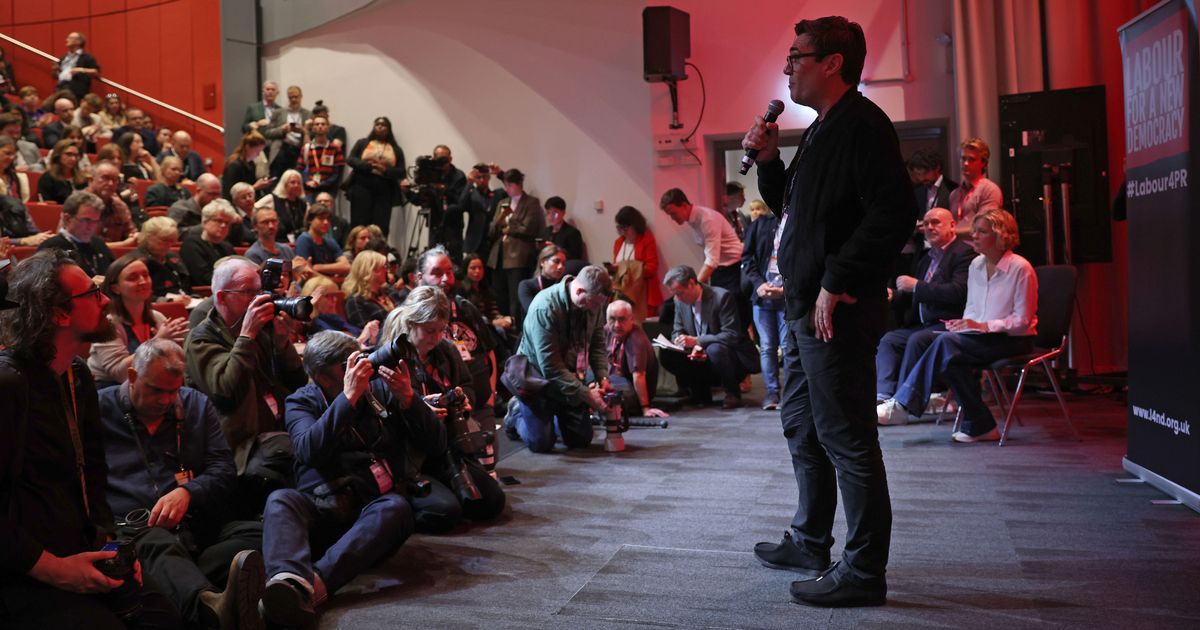Reporter Dan Haygarth looks at where the Labour Party goes after its conference in LiverpoolDan Haygarth Liverpool Daily Post Editor and Regeneration Reporter
06:30, 05 Oct 2025
Dan Haygarth is a senior reporter who focuses on the regeneration of the Liverpool City Region. He looks at social and political issues facing the region, as well as writing about culture, business and the built environment. He also has a particular interest in covering stories from Merseyside’s hospitality industry. Born in Liverpool, Dan joined the ECHO in January 2022 having previously been a reporter for CambridgeshireLive.
 Andy Burnham, Mayor of Greater Manchester, speaks onstage during the Labour Conference 2025 at the ACC Liverpool(Image: Dan Kitwood/Getty Images)
Andy Burnham, Mayor of Greater Manchester, speaks onstage during the Labour Conference 2025 at the ACC Liverpool(Image: Dan Kitwood/Getty Images)
“There’s nothing more unstoppable than an idea whose time has come”, said Andy Burnham as he walked into a fringe event on the first day of the Labour Party Conference in Liverpool. The Merseyside-born Mayor of Greater Manchester was the centre of attention as the conference began, with rumours of a leadership challenge to Sir Keir Starmer swirling.
His arrival at a fringe event on electoral reform and proportional representation (PR) in a hall at ACC Liverpool on Sunday evening was met with a deluge of photographers. The room was packed out with members of the press – and it was not necessarily Mr Burnham’s view on changing the voting system which had brought them there.
Though said about PR, the “idea whose time has come” comment could be interpreted in a number of ways given the talk going into the Labour conference. There were two feature interviews in national publications in which the mayor criticised the current administration, talked up his own vision for the country and admitted he was being urged to challenge Prime Minister Keir Starmer.
Mr Burnham is a vocal supporter of proportional representation and used his speech at the fringe event to make his point that changing the voting system could allow for the introduction of a new type of politics, one which aligns with his brand of ‘aspirational socialism’. But he also called on the Labour Party to be braver and make changes to how it operates.
The 55-year-old told the room he had done no more than launch a debate in the party – he said he supported the government but made it abundantly clear he wanted to see a number of changes.
“One thing I am worried about, and I think we do need to debate at this conference in my view, is how can you have an open debate about all of those things if there’s too much of a climate of fear within our party and the way the party is being run?” he said.
He also criticised a situation where “a party member is suspended for liking a tweet by another political party, or a Member of Parliament loses the whip for trying to protect disability benefits”.
He added: “If that is the way we’re doing things, where debate is being closed down, that to me is what we’ve got to change.”
The Old Roan-born mayor received repeated rounds of applause from the audience and said Labour needed to make a number of structural changes to the country, which would be enabled by electoral reform.
 Andy Burnham, Mayor of Greater Manchester, walks outside the ACC Liverpool during the Labour Conference(Image: Dan Kitwood/Getty Images)
Andy Burnham, Mayor of Greater Manchester, walks outside the ACC Liverpool during the Labour Conference(Image: Dan Kitwood/Getty Images)
He continued: “In my view, we’re living in a time where we have lost control of the cost of the essentials and in many ways, we’ve lost control of the cost of public spending.
“Because everything was broken up and sold off in the 1980s – we don’t control life’s essentials in a country in a way that we once did. People are overpaying for water, housing, energy and transport, and the country is overpaying for those things as well.”
He added: “When you have a benefits system that is chasing rents in the private rented sector, that’s what I mean about losing control of your costs.” He was met with many cheers and rounds of applause from the room.
Offering a fix to these problems, he said: “What I think a move to the proportional system would do is it would allow a new politics to come in, where parties that can agree could set a long-term approach to repairing the basics, building the council and social homes that we need as a country over a 10-year period.”
Sitting in the room, among the many journalists, I thought the conference was about to be brought to life. Though he said the government had his support, it seemed Mr Burnham’s ‘new politics’ would be presented against Sir Keir’s mission of ‘renewing Britain’ in a jostle for the direction of the party over the conference and beyond.
As it happened, it didn’t go much further than that and essentially fizzled out. The Greater Manchester Mayor was followed by inquisitive journalists everywhere he went across the ACC, asking if he wanted to be leader.
The major obstacle to that for the time being is he would need to be an MP, rather than a mayor, to lead the party. Regardless, on Monday, he said Sir Keir was the right man to be in charge, dampening speculation of a challenge.
On Tuesday, Sir Keir took to the stage in the main hall at Liverpool Exhibition Centre to make his case for the future of the party. According to many in attendance, it was his best conference speech yet, as he vowed to stand up to racism and those sowing division in Britain.
He used his party conference address to set out his vision for a “new country” – a “land of dignity and respect”. And like many Labour politicians at this year’s conference, his speech also gave plenty of time devoted to Reform UK before key elections in Scotland, Wales and English counties next year.
 Keir Starmer gives his speech during the Labour Conference at ACC Liverpool (Image: Dan Kitwood/Getty Images)
Keir Starmer gives his speech during the Labour Conference at ACC Liverpool (Image: Dan Kitwood/Getty Images)
Nigel Farage’s right-wing party has a lead in a number of polls and Labour clearly see them as their major electoral rivals. Sir Keir claimed Mr Farage doesn’t like Britain, as he criticised his policy and approach, saying Labour was in a “fight for the soul of our country”, presenting his party as representing the “tolerant, decent, respectful Britain I know”.
But Sir Keir’s first year or so has been met with many challenges, but most would say it has not gone to plan. Polls show his popularity among the public is far from great – and it remains to be seen whether his conference speech will change that.
As such, the question of leadership of the party is not likely to go away. Though Mr Burnham may have played his hand wrong in Liverpool, there is still much for the party to weigh up if it is to perform well in next year’s batch of elections.
At Sunday’s fringe, Mr Burnham addressed that. He told the room he wanted to spark a debate for the good of the party – giving them the best chance of beating Reform.
Mayor Burnham said: “What I would say to those who say that I’m speaking out purely for my own ambition is, I can say to you all tonight, I am speaking out for the thousands of councillors here at this conference who are worried about going to those doorsteps next May, speaking for the members of the Senedd who, again, are working hard to keep Wales Labour; that’s what we want to do next year.
“And, of course, members of the Scottish Parliament as well, who want a stronger story about Labour to go to those doorsteps. I’m speaking out for the millions of good people around Britain who want a more hopeful direction for the country.
“I think we can do it. I honestly believe it can be done. We can make this government work, we can find that more hopeful direction and we can win again at the next general election.”
Before the conference, a YouGov MRP poll showed a Reform UK government would be a near certainty if an election were held then – with the party in touching distance of a majority. That is a remarkable position for Labour to be in little more than a year after winning a landslide.
On the back of a conference in Liverpool amid the surge of Farage, Labour still has lots of thinking to do if it wishes to win again. And unless Sir Keir wins the country over, the question of leadership will not go away.
